In this post
6 Types of IT Jobs That Are Great for Creative People

Often, an information technology career evokes a vision of html, codes, operating systems, cyber security and statistics. While this is true, there is a high level of creativity needed in many jobs within this massive and varied sector.
From the occasional social media user to the CEO of a huge tech company, all people value technology more if it is interesting, artistically considered, and aesthetically pleasing. Even the internet favours unique and easily digestible content for varied demographics.
There is a tech career for anyone with a creative flair and a thirst for new advancements in the digital world — and you don’t necessarily need a technical degree to start one.
These six different types of IT jobs require innovation and creativity as much as an analytical mind:
- Web developer
- UX designer
- Augmented reality designer
- Software designer
- Digital animator
- Game designer
Discover more about these jobs, and learn how your current skills might be transferable. You’re so close to finding your dream job in IT that combines your interest in technology and your creativity — and pays well too!
Web developer
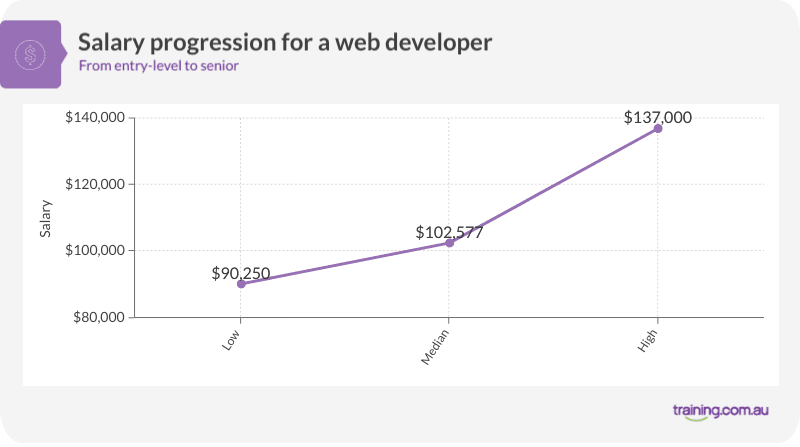
Role description
A web developer makes and maintains websites using codes and other specialised inputs.
They’re in charge of technical aspects like programming, website speed, and capacity and performance. They also lead the overall look and feel of a website.
While many developers work in collaboration with web designers and other stakeholders, they are often required to work with video, audio and graphics, and these creative skills allow them to provide a complete service to their clients.
Creative skills of a web developer:
- Graphic design
- Image editing
- Developing wireframes
- Site mapping
- Layout designing
Getting into the role
You may know more about the technologies used to create websites than you think. We use new programs all of the time, and most of us have a basic understanding of how they work just by using them.
Although it’s possible to get employment as a web developer without formal qualifications, most employers will prefer you to have undergone training.
A VET course such as a certificate in information technology can be an excellent place to start and covers all skills and knowledge needed to gain an entry-level position. A diploma of information technology could open you up to other roles in technology should you like to have a more flexible outcome.
UX designer

Role description
UX designers work to create and develop digital processes, from start to finish, for projects like apps, websites, games and software.
Their job involves looking at, designing and working with other professionals to create the best user experience for front-end interfaces using an understanding of human behaviour.
They are also involved in research, testing and problem-solving and are often in contact with designers, branding professionals and strategists who they collaborate with on large projects.
Creative skills of a UX designer:
- Layout design
- An eye for detail
- Visual communication skills
Getting into the role
With no formal UX Design qualification available, people usually enter this job from related areas.
Any past roles involving design principles, web development, digital production or app development will give you a solid foundation for this job.
Basic skills in UX design can be developed through a short course or by joining local networking groups.
Augmented reality designer
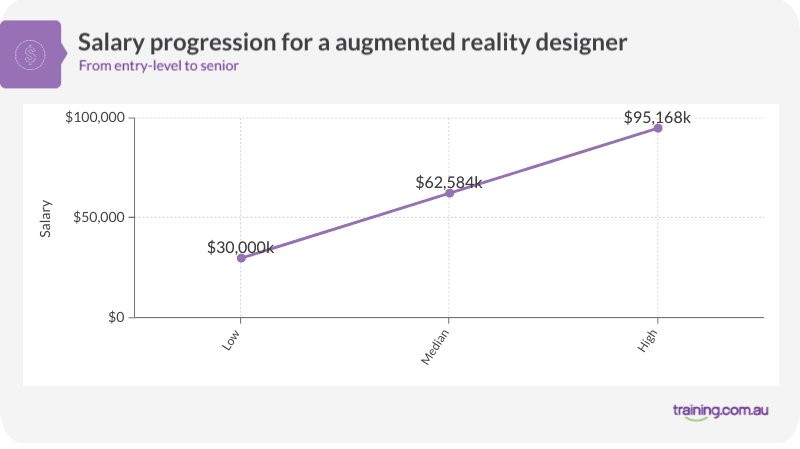
Role description
Augmented reality is popping up more and more in the tech we use each day. Brands have even been using it to allow us to try on clothes and play games with characters that enter our reality through the magic of our smartphones.
A job designing augmented reality requires you to find new ways to connect the digital world with our own. These skills are used to create campaigns and produce the visual media aspects to go along with them.
Creative skills of an augmented reality designer:
- Design
- Animation
- Digital art
- Visualisation
- 3D modelling
Getting into the role
Like many types of IT jobs, to become an AR designer, you generally need to have a background in coding and have knowledge of the programming languages used to create interactive media.
As augmented reality is an emerging technology, people often get into these roles via pathways from other tech or digital design jobs.
If you don’t have a tech or digital background, you may want to undertake an undergraduate degree in information technology to develop and hone the fundamental skills of this industry.
If you have some experience, you could develop your AR skills by creating content on your own and building a portfolio of work to enhance your job applications. You could also take a short course in AR and VR applications or strategy.
Software developer
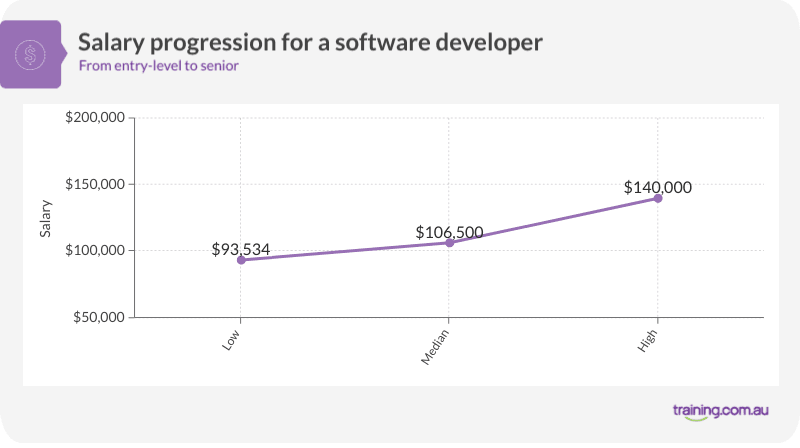
Role description
Software developers are IT professionals who create, test and implement software for a broad range of applications using programming skills and technical knowledge. They also design the software they develop, which is where a lot of creativity comes in.
Like all types of IT jobs, they work with computers and information systems daily. These professionals can work in either a team with other tech professionals or as freelancers. They may also be in charge of project management.
Creative skills of a software developer:
- Layout design
- Visualisation
Getting into the role
It is possible to get into a career as a software developer without a formal qualification. But you will want to have the IT skills needed to perform the job confidently, and employers prefer to hire people with experience in a related field.
A bachelor’s degree in computer science or software engineering, or a diploma in information technology will give you the core skills needed in this role. In addition, taking in an internship while studying is a great way to get your foot in the door.
A role in software development could lead to further and more senior jobs in IT if you choose to push your career in that direction.
Digital animator
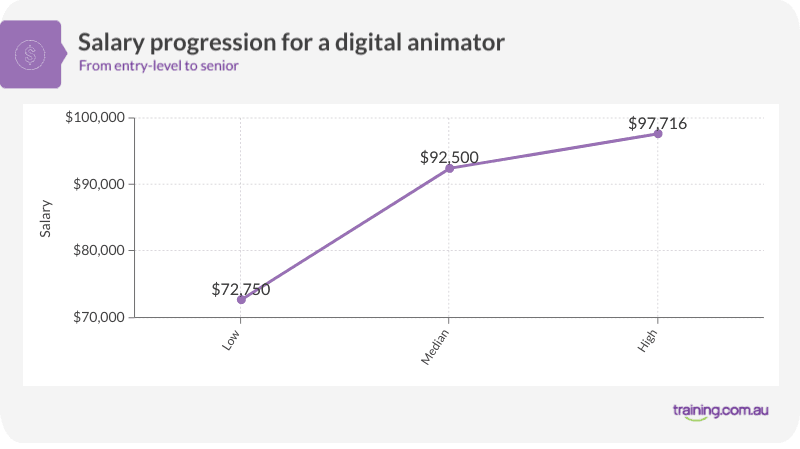
Role description
A digital animator’s job description is to use computers to create moving illustrations that can be used in films, games, or videos.
Of course, this role requires creativity and strong artistic skills. But there is also a need for solid knowledge of the computer programs used to make the illustrations.
Creative skills of a digital animator:
- Digital art
- Illustration
- Visualisation
Getting into the role
To become a digital animator, you may not need an IT background. With the focus of the role being on the design of the illustrations, the tech aspect can be picked up along the way or studied through a short course.
A VET qualification in digital media, design or game art is also a great way to hone your artistic skills.
Game designer
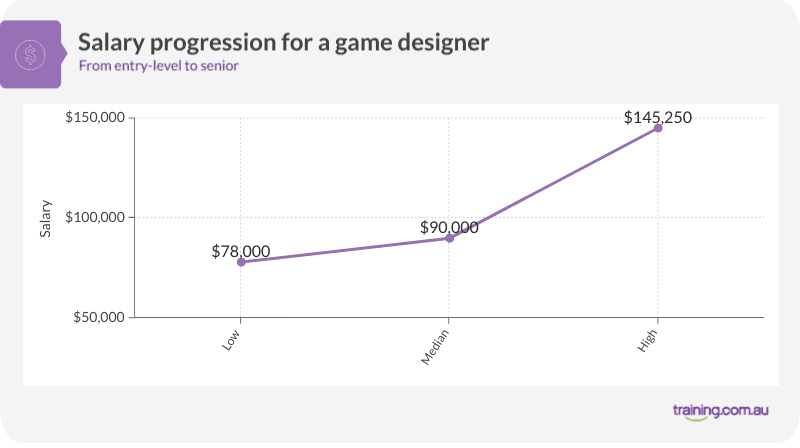
Role description
A game designer invents, develops and produces video games and generally works in a team including developers and animators.
Along with a fundamental understanding of how IT works in conjunction with the games, the role requires a high level of imagination, creativity, and knowledge of what makes a good game.
Creative skills of a game designer
- Design
- Artistic ability
- Visualisation
- Storytelling ability
Getting into the role
Most game designers start their careers through their studies, or jump into the role from careers in digital media or design.
If you’re keen to develop and hone skills in video game design or production, a VET course in interactive games or game development is the best place to start.
This role offers lots of room for progression as well. By undertaking further study or a bachelor’s degree in games or interactive design, your career as a game designer could lead to a senior job title, like lead game designer, in the future.
There are so many career choices in tech available for creative people. Our reality is becoming more and more immersed with the digital world, and your skills in design, eye for aesthetics and flair for creativity are becoming exponentially more valuable in the field of IT. You don’t need to choose between following your love of tech and your love of creativity. And by pursuing a career where you can combine your passions and skills, you’re going to stand out to employers.
We are so lucky these days to have a vast selection of resources to help us get into new jobs — including courses that can be easily accessible, affordable and flexible enough to fit around already busy lives.
IT career paths are available and highly accessible to you — especially with your new, finely honed skills (or the ones you bring from past careers). Are you ready to take the first step towards your dream job in IT?
Ready to browse IT courses? Check out your options here.
Browse IT Results
Certified AI-Powered Digital Marketing Specialist
Digital marketing in Australia is growing rapidly, SEEK are forecasting a 11.4% increase in job opportunities over the next five years. With roles available nationwide and an average salary of $88,000, now is the ideal time to build in-demand skills an...
Diploma of Counselling Practice CHC51015
Gain a solid theoretical foundation to start your journey into counselling practice or further study. The Institute’s Diploma of Counselling Practice introduces you to general counselling theories, ethical and legal practice, personal and professional...
Double Diploma of Project Management and Leadership & Management BSB50420,BSB50820
CAL’s Double Diploma of Project Management Practice and Leadership & Management has been designed to equip you to succeed in project management and leadership roles with the ability to plan, design, apply and evaluate solutions. You’ll gain the sk...
Double Diploma of Human Resource Management + Leadership & Management BSB50320,BSB50420
CAL’s Double Diploma of Human Resource Management + Leadership & Management gives you the skills you need to progress your career into senior leadership roles. You’ll be equipped with the skills you need to lead and manage workplace relationships,...
Diploma of Human Resource Management BSB50320
Human resource (HR) management is a valuable and rewarding career, with HR expertise essential in every modern business. Human resources professionals today lead the human resources department, supporting staff with personal and professional developmen...
Double Diploma of Business (Leadership) & Leadership & Management BSB50120,BSB50420
By completing the Double Diploma of Business (Leadership) and Leadership & Management, you’ll develop key skills in resource management, leadership and communication. You’ll strengthen your ability to manage teams, policies and finances, preparing...
Diploma of Building and Construction (Management) CPC50308
Unlock the next level of your career with our future-focused Construction Management qualification. The modern workplace now actively seeks out and rewards construction project managers who: Are not afraid to lead, motivate and inspire their team Can c...
Certificate III in Business BSB30120
Get the skills, knowledge and practical experience you need to start a career in the Business sector, with Open Colleges’ BSB30120 Certificate III in Business. Gain a strong set of practical office skills that are valued by employers, which you can put...
Graduate Diploma of Sport Management
The Graduate Diploma of Sport Management (GDSM) has been developed based on extensive consultation with experts in the field. This provides you with not only a post-graduate degree but also crucial work experience that aligns with industry requirements...
Data Analytics Launchpad Certificate
Curious about the world of data but not sure where to start? The Data Analytics Launchpad is your entry point into one of the fastest-growing fields in tech. Over 10 weeks, you’ll build practical skills in data analysis, visualisation, and storytelling...
AI-Powered Full Stack Business Analyst Diploma
Bridge strategy and code. Lead with insight. Build with impact. The Diploma in AI-Powered Full Stack Business Analyst uniquely blends business analysis, UI design, creating applications with low-code tool, front-end coding skills, and AI-driven workflo...
Business Analyst & Salesforce Certification
Ready to drive strategic decisions and shape powerful tech solutions? Excited to bridge the gap between business needs and technology? Learn to analyse, strategise, and design innovative solutions as an AI-Powered Business Analyst. From mastering Agile...
AI-Powered Full Stack Developer Diploma
Ready to go from the basics to become the centre of AI innovation? Launch your tech career with our structured 32-week Diploma, combines two powerful Accelerators. You’ll start by learning to create modern full stack applications from scratch, th...
Full Stack Developer Micro-credential: Technology Product Development Essentials Certificate
Excited about solving real-world business and community challenges by builiding full-scale web applications? Step into the future of tech with our Full Stack Developer programme. You’ll dive into the world of software development – combining fron...
Data Analytics and Advanced Business Intelligence Diploma
Ready to build a complete skillset in data analytics, step-by-step? Whether you’re just starting or looking to grow into a more technical role, this programme gives you the hands-on skills and confidence to extract insights, automate workflows, a...
Certificate IV in School Based Education Support (VIC ONLY) CHC40221
The qualification CHC40221 – Certificate IV in School Based Education Support is referred to in industry as the Cert 4 Education Support or your teacher’s aide course. Education support workers assist teachers and support student learning in a range of...
Certificate III in Early Childhood Education and Care (Melbourne Only) CHC30121
Are you patient, flexible and wanting to help nurture our future generation? Our CHC30121 Certificate III in Early Childhood Education and Care is a course designed for entry-level into the early childhood education and care industry. As a childcare wo...
Certificate IV in Business (Administration) (NSW Traineeship) (NSW Only) BSB40120
This qualification reflects the role of individuals in a variety of Business Services job roles. These individuals may have supervisory performance accountabilities. Individuals in these roles carry out a mix of specialist and moderately complex admini...
Animal Health & Veterinary Care Foundations
Get ready to turn your love for animals into a rewarding career! Go behind the scenes with animal and veterinary care experts at RSPCA Queensland and other leading organisations. Find your passion as you learn about every aspect of animal health and ca...
Psychology & Mental Health Essentials
Explore the fascinating psychology behind our brains, bodies and behaviours and learn new ways to improve mental health and wellbeing. Learn directly from Australia’s leading counsellors, psychologists and health coaches. Discover the complex inner wor...
Online courses also available
Latest Articles
Agriculture Careers: What You Should Know in 2025
As one of Australia's most important industries, the agriculture industry offers great career opport...
Are Digital Skills the Key to Job Security in 2025?
The digital revolution is here, and it doesn’t care if you have a technical job or not — it’s coming...
How to Become a Chef in Australia: Complete Guide for 2025
The complete guide to becoming a chef in Australia. Learn how to get your start and make it in the h...
Want to read more?
Going Back to Work After a Long Break: Navigating the Transition
Returning to work after an extended break can be as exhilarating as it is intimidating. Whether your...
Is There a Demand For Bookkeepers in Australia?
Bookkeeping is a vital part of any business, ensuring financial records are accurate and up-to-date....
24 Most Fulfilling Jobs That Work With Kids: Which Is Your Calling?
Is working with kids your calling in life? Discover the 6 jobs working with children rated most fulf...










